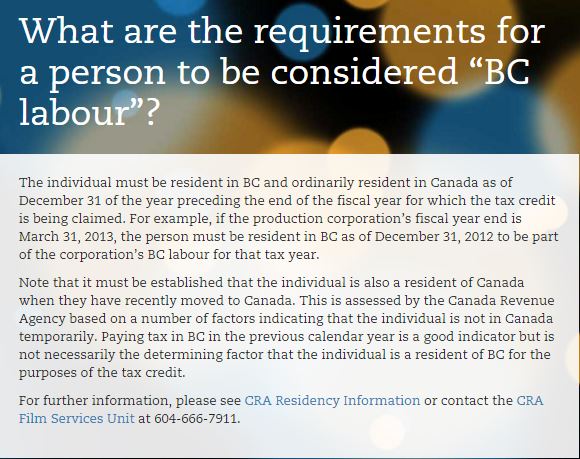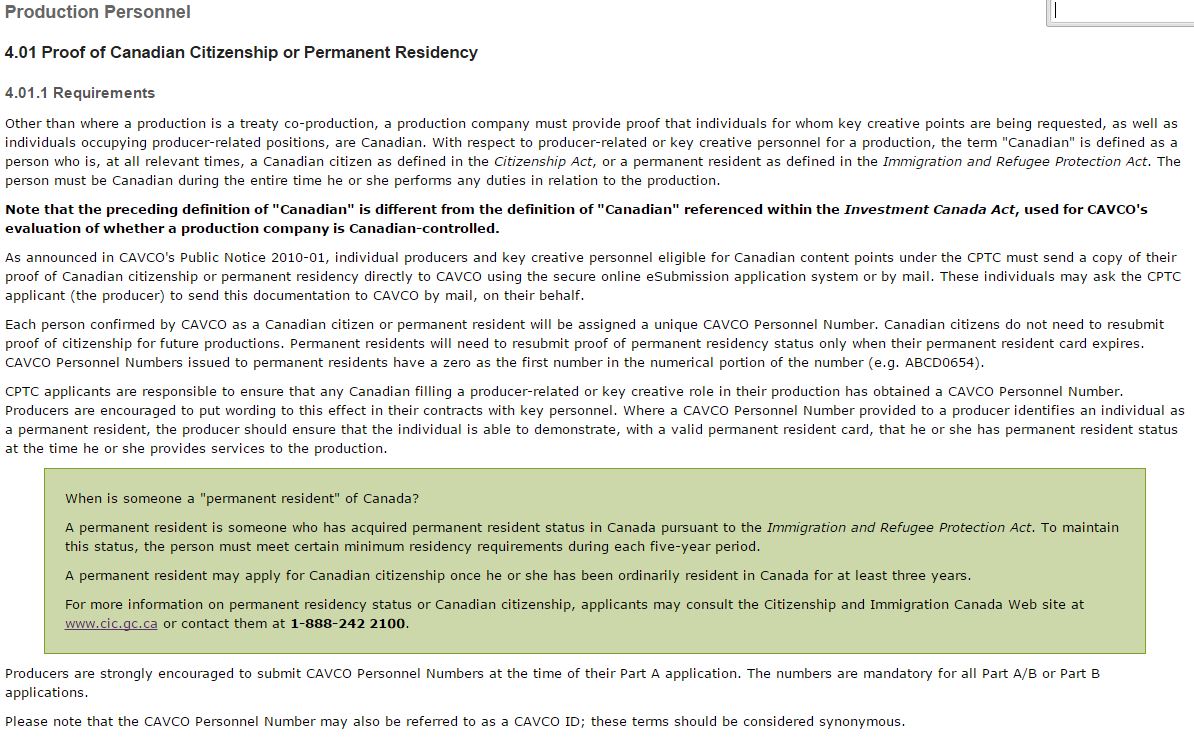As of February 17, 2016 CIC (now “IRCC”) will open up a new exemption to the Labour Market Impact Assessment (“LMIA”) requirement which should open up Canada’s television and film production industry to select temporary foreign workers (“TFWs”).
It appears from the program delivery instruction provided by IRCC (here) that this exemption is aimed at bigger name productions. These are as the instructions put it “high value TV and film productions” that are “considered to create and maintain significant economic benefits and opportunities for Canadians and permanent residents.”
Importantly, and stepping outside the restrictive barriers that were previously provided by co-production treaty agreements, these films can be both foreign or Canadian and there is no requirement as to the portion which the TV or film is actually filmed in Canada. The workers are expected to be high wage, which in British Columbia is defined as earning more than $22/hr.
There appear to be two major stakeholders that will essentially define the success for the TFW’s work permit application on the basis of this LMIA exemption – the production company and the union/guild that the TFW is part of.
The production companies will need to provide a letter of support, setting out information about the production, shooting location, and a confirmation that the individual and position are vital to the production. They will need to detail the significant economic benefit to Canada of the TV or film production itself – including the number of Canadian jobs created, the budget spent in Canada, and also a statement confirming that the project satisfies the criteria for federal/provincial/territorial tax credits for funding.
The union/guild will similarly need to provide a letter describing the union guild, providing information about the production, the name of the applicant, and a statement confirming that the union is of the view that the work being performed is subject to a collective agreement and that they have no objection to the work by the Temporary Foreign Worker.
IRCC states that the work permit validity will be the earlier of the end of the expected production (give or take additional time granted by immigration officers for re-entry/re-filming) or the expiry of the Applicant’s travel document (i.e. passport).
Planning the Pathway to Permanent Residence
From my initial research and discussion with unions and individuals in the industry, for most TV and film crew members who want to have a longer-term establishment in the Canadian job market, permanent residency will eventually be an important step. Hiring in TV and film in Canada is highly dependent on the backend tax credits and benefits the producer can expect to receive. Those credits and benefits are often dependent on the residency and status of the crew involved in the production.
That being said, it is very possible to transfer from a TFW to permanent residency while preserving one’s working career in TV and film in Canada. This is important as I understand the film and tv industry to be unforgiving to employment gaps that can often be created through immigration processes.
I think the following are useful factors to note.
Contrary to public opinion, unions and guilds do not all have Canadian permanent resident requirements and those that do, often have soft requirements. Particularly where the union is in high demand for members and have a shortage in a specific position, they may be able to bend the requirements. I know that some unions operate on a tax resident or demonstrated permanent intention threshold for membership rather than a strict legal status requirement. Unions appear more focused on the Applicant’s background and expertise in the particular role they are seeking membership in (subject to any collective agreement stating otherwise).
With union membership secured, the question then becomes finding jobs with a tax credit/funded position. Again, it is not true that all workers must necessarily be Canadian permanent residents of citizens to qualify for tax credits. For example, Canadian producers can claim Film Incentive B.C. (“FIBC”) tax credits for what is called B.C. Labour. B.C. Labour is defined strictly in terms of tax, rather than legal residency.
“The individual must be resident in BC and ordinarily resident in Cnaada as of 31 December of the year preceding the end of the fiscal year for which the tax credit is being claimed… “Paying tax in BC in the previous calendar year is a good indicator but is not necessarily the determining factor that the individual is a resident of BC for the purposes of the tax credit”
However, for several of the federal tax credits such as the Canadian Audio-Visual Certification Office (CAVCO)’s Canadian Film or Video Production Tax Credit (CPTC), a strict legal definition of Canadian residency is adopted. CPTC operates on a detailed point system (that I won’t get into in this post), but it requires that certain key positions are filled by Canadian permanent residents or citizens in order for credits to be granted.
With respect to producer-related or key creative personnel for a production, the term “Canadian” is defined as a person who is, at all relevant times, a Canadian citizen as defined in the Citizenship Act, or a permanent resident as defined in the Immigration and Refugee Protection Act. The person must be Canadian during the entire time he or she performs any duties in relation to the production.
I’m a TFW. Where is the starting point?
For a foreign national looking to come to Canada to work in TV and Film Production with a future intention to be a permanent resident, it may be useful to take advantage of the new LMIA exemption. Work experience in Canada will often times begin the immigration process by providing temporary Canadian work experience that will directly assist or springboard into options for permanent residency. For example, LMIA-exempt work permit holders have various options to obtain LMIAs in support for permanent residency, Provincial Nominations, and/or may even be able to qualify for permanent residence solely on the basis of their foreign (and now Canadian) work experience.
Realistically, this LMIA exemption appears to be limited to major productions with significant Canadian benefit in terms of jobs and expected revenue. For those currently working in smaller/non-funded productions, and where the union process and the type of productions are not available, it may be useful to use the wonderful film/media education available in Canada as a bridge.
Ultimately, the complexity of issues such as tax, funding, and unions certainly will create the need for unique immigration and work permit strategies for TV and film workers hoping to seek long-term employer and residency in Canada.



